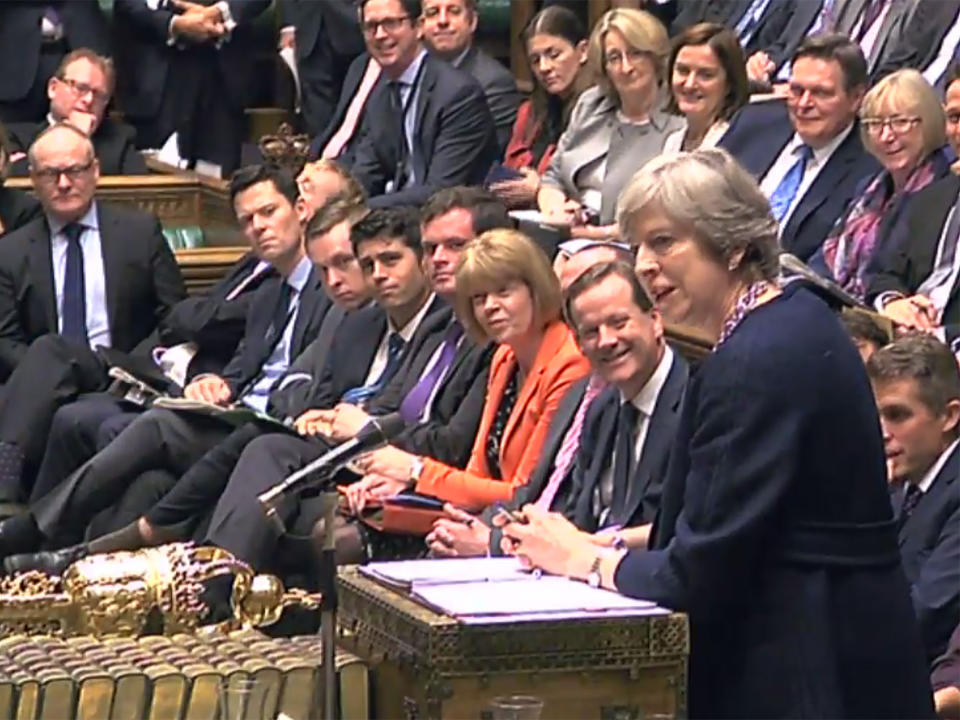From her PMQs slip-up to the Universal Credit debate disaster, today has been an embarrassing day for Theresa May
After today’s Prime Minister’s Questions, it has suddenly become less likely that Universal Credit will ever be fully rolled out. Jeremy Corbyn rather impressively under-played his victory, announced this morning, in securing a freephone helpline for claimants. Recognising that this was a small but significant step, he asked if the Government would pause the roll-out of Universal Credit altogether.
“Yes,” said Theresa May, to hoots of triumph from the Labour benches. “I suggest that opposition members listen to the whole sentence,” she said, when the hubbub had died down, but I suspect she spoke truer than she knew.
Universal Credit was always the third Heathrow runway of social policy. Most people are in favour of it in principle, but its completion date has long been postponed. This morning, David Gauke, the Work and Pensions Secretary, announced the climbdown on freephone numbers, a week after Corbyn raised the problem of a helpline that cost up to 55p a minute from mobile phones. But he also confirmed that, after seven years, Universal Credit has been extended to cover just one tenth of claimants.
For most of those years, small numbers of people with the simplest claims have been put on Universal Credit in a series of pilot schemes. Recently, the Department of Work and Pensions has started to expand the programme to all claimants in selected jobcentres nationwide.
Already, the bad stories have started to grow, step by step with the expansion of numbers. The Independent published an account last week by an anonymous manager that painted a picture of an underfunded, understaffed system run by people well aware of the cruelty of the policy they are asked to administer. This was dismissed by Neil Couling, Director General of Universal Credit at the DWP, as “anecdote and opinion”.
If so, there is an awful lot of it about, filling a lot of MPs’ inboxes. The six-week delay in starting payments is the focus of much of the wave of protest that Corbyn carried into the Commons last week. The Prime Minister, who had obviously been briefed on it, said that half of families waiting for six weeks had been given an advance to tide them over – which means that half of them had not, and in any case this is a loan that is deducted from payments later.
So it is not simply a matter of anecdotes, then, if the Prime Minister has the figures for advances. And the big numbers remain intimidating. The switch-over to Universal Credit coincides with a freeze in the cash value of benefits, now being cut by inflation by 3 per cent a year. At the same time, some benefits are being cut even in cash terms. The Government’s policy is that no claimant should lose out by switching to Universal Credit, but as soon as their circumstances change, so can the level of their benefits. Most of those huge cuts in “welfare” that David Cameron and George Osborne pencilled in during the 2015 election campaign are still there in the Government’s spending plans for the next few years.
This afternoon, Labour is devoting one of its opposition debates in the Commons to Universal Credit. Theresa May’s position is so weak that her whips are expected to instruct Conservative MPs not to take part in the vote at the end of it, on a motion calling again on the Government to pause the roll-out. That means two Labour whips will have to volunteer as tellers to count the Government’s votes so that there can be a recorded vote.
It is not a binding motion, so the Government can ignore it for the time being. But it will be embarrassing, and bears a long-term significance, which is that the Prime Minister cannot muster a majority in the House of Commons for the nationwide expansion of Universal Credit. Without a majority, it must be doubtful that Universal Credit will ever go nationwide.

 Yahoo News
Yahoo News 

